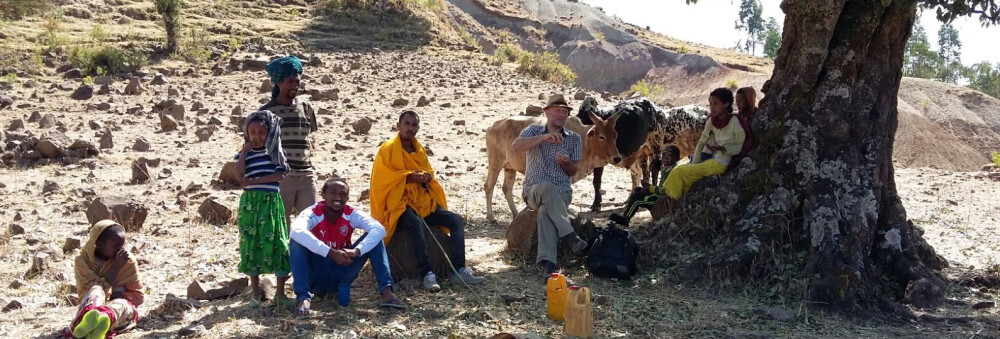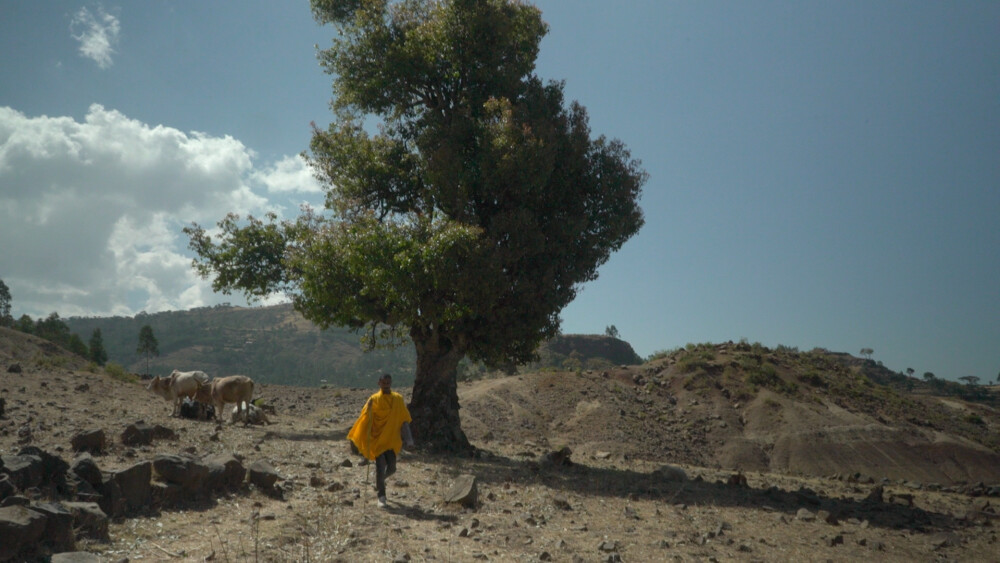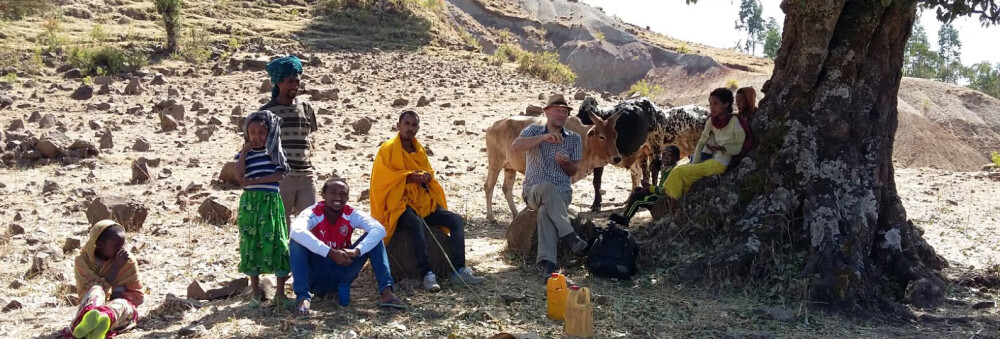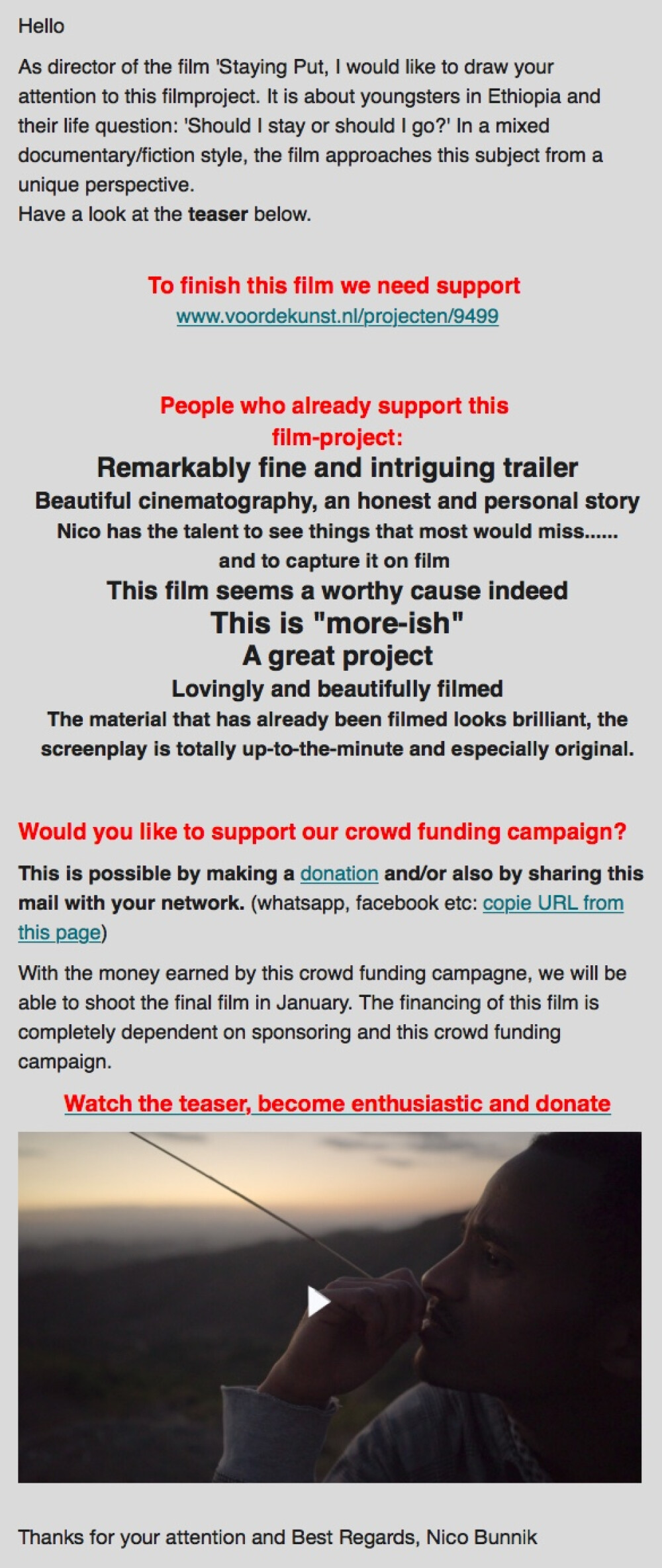---------------------------------------------------------------- 'Looks amazing Nico. A stunning continent and a beautiful contrast of identities and lifestyles. Can't wait to watch it...'
'Elk land heeft gemotiveerde mensen nodig om verder te komen. Als iedereen wegtrekt wordt het een leeg land zonder toekomst' 'Because... the trust in Nico in making something special'
----------------------------------------------------------------
'Looks amazing Nico. A stunning continent and a beautiful contrast of identities and lifestyles. Can't wait to watch it...'
'Elk land heeft gemotiveerde mensen nodig om verder te komen. Als iedereen wegtrekt wordt het een leeg land zonder toekomst'
'Because... the trust in Nico in making something special'
-
-------------For English see below, dutch text!-------------
Terwijl de meesten van zijn leeftijdgenoten wegtrekken, besluit de 25-jarige Ethiopische Abebe juist in zijn dorp te blijven wonen.
Staying Put. Een film gebaseerd op ware verhalen.
(80/90 min.)
Abebe woont in Lalibela, een stadje in het hooggelegen noorden van Ethiopië. Veel jongeren uit zijn omgeving vertrekken naar Addis Abeba of verder, hij wil blijven. Hij besluit een pelgrimstocht te maken naar Gishen Mariam. Vanuit zijn perspectief, zijn gedachten en belevingswereld volgen we zijn weg. Een verhaal over een leven tussen de zeer oude cultuur en de opkomende moderne tijd. Een zoektocht naar een zinvol leven.
Hoofdpersonen
Regisseur Nico kent Abebe al sinds zijn 15e. In die tijd was hij een dakloze ‘shoeshine” jongen. Nu leeft hij op een stukje land, geërfd van zijn moeder. Werk en geld heeft hij niet. In zijn zoektocht als jonge man - Wie ben ik? Wat wil ik? en Wat kan ik gaan doen met mijn leven? - vindt hij houvast in zijn cultuur en geloof. Hij is een serieuze, oprechte en religieuze jongen. Sommige gewiekste zakelijke types vinden hem wellicht naïef.
“I don’t need money to become miljardair. I don’t pray for this. I want to be like the holy King Lalibela (12th century), not to become King but to help poor people like he did. This is my dream.”
Abebe is een idealist.
Wogen is het tegenovergestelde van Abebe, pragmatisch en eerlijk opportunistisch. Hij leeft van dag tot dag, is minder serieus over het leven, maakt daar vooral grappen over en provoceert.
Hij is de nar van het groepje ‘hang’-jongeren in Lalibela:
“I love Africa. I don’ care, today I have food. Tomorrow friends have, we will eat together. This is African life !!”

Waarom
Steun dit project als je het belangrijk vindt dat ook de jongeren die in Afrika blijven, een gezicht krijgen. Via de media krijgen we veel berichten over immigranten die van Afrika naar Europa vluchten. Maar hoe gaat het nu met de jongeren die bewust niet willen emigreren en achterblijven terwijl om hen heen veel vrienden de oversteek wagen? In deze film krijg je een beeld van de jongeren die blijven. Jongeren die, in hun geboorteland, hun levensweg zoeken.

Filmplan
Abebe en Wogen willen allebei, in tegenstelling tot veel vrienden die naar het westen zijn vertrokken, blijven wonen op hun geboorteplek.
We trekken samen met Abebe en Wogen, door het hooggelegen noorden van Ethiopië. En ontdekken hoe het is om te leven in dit afgelegen en rurale gebied. Ook voor Abebe en Wogen, jongens uit een klein stadje, is het leven buiten hun stadje veelal onbekend terrein.
We zien hoe de jonge generatie, de vrienden van Adebe en Wogen, worstelt met de keuze om weg te gaan en we ontmoeten mensen in de afgelegen gebieden, die wellicht nooit hun land zullen verlaten.
We trekken door het uitgestrekte land waar vooral op een traditionele manier geleefd wordt; de boeren, de kloosters, de oude monolithische (in de bergen uitgehouwen) kerken, maar ook de meer moderne ruwe en rauwe steden.
De pelgrimstocht eindigt boven op de berg bij de kerk Gishen Mariam waar jaarlijks tien duizenden pelgrims samenkomen.
De reis wordt een innerlijke zoektocht naar hun roots en de oude cultuur. Wat heeft dit leven voor hen te betekenen, wat zijn de mogelijkheden? Hoe een zinvol bestaan hier op te bouwen?
Aanvullende Teaser Staying Put (4min), hier


Stijl
In een mix van speelfilm en documentaire reizen wij door het land. Abebe en Wogen acteren zichzelf en improviseren op de situaties. Abebe als de pelgrim op zoek naar zingeving en Wogen de nar, die als een duiveltje op Abebe zijn schouder meekijkt en Abebe’s geweten beproeft, relativeert en hem pest. Plots kan hij opduiken en is dan weer weg.
De film laat via de gespeelde en geïmproviseerde scènes de belevingswereld van Abebe zien; zijn innerlijke wereld, dromen, herinneringen aan vroeger, etc.
Tijdens de reis houdt Wogen Abebe op de hoogte van de roddels en gebeurtenissen thuis in Lalibela. Is het Fre, vriendin van Abebe en eigenaar van de shop waar de jongeren samenkomen, inmiddels gelukt om met de Noorse man te trouwen?
In de werkelijkheid en in de film zal het een zware reis worden, waarin confrontaties niet uit de weg worden gegaan. Een louterende reis, waarin frustraties, het leven niet meer zien zitten, maar ook de lol en het plezier van het leven hier in dit land zichtbaar worden.
Staying Put, een film met een magisch realistische impact.

Geef voor dit project!
'Beggars are those who serve God'
Abebe, link
Dit project is 100% crowdfunding.
Het wordt een persoonlijke, authentieke film die met hart en ziel gemaakt wordt, 100% inzet en 100% crowdfunding is in deze een must. De 100% inzet is er al, daarnaast worden filmapparatuur en vele andere zaken inmiddels gesponsord.
Voor de opnames hebben we, naast de privé inbreng van de makers minimaal een bedrag van €10.000 nodig om dit te kunnen verwezenlijken. Er staan twee opname-periodes gepland. De deBun Studio staat garant voor de post-productie. Gemeente Den Haag stort 25% bij als 75% van het streefbedrag is toegezegd.
Ook wordt dit filmproject in woord en daad ondersteund door o.a.:
BiraBiro Films, Filmhuis Den Haag, Humanity House, Movies that Matter....
Producent is Stichting Filmstad
Aanvullende Teaser Staying Put, hier

De Makers
Nico Bunnik, regisseur, producent
Is een ervaren filmmaker. Hij werkt naast zijn eigen films regelmatig voor andere filmproducties en heeft al aan diverse filmproducties in Afrika gewerkt; hij weet wat hem te wachten staat. Nico kan erg goed improviseren, waardoor onverwachte situaties juist een meerwaarde kunnen krijgen. Nico heeft zijn opleiding als filmmaker gevolgd aan de Cine-Work-Shop van de Vrije Academie in Den Haag.

Zijn laatste film ‘Atla’, die zich afspeelt in de Sinaï woestijn, is een lange documentaire en heeft op meerdere filmfestivals gedraaid. (o.a. PEK, Nederlands Film Festival, ECU, Split) Hierin trekken twee Bedoeïenen, een witte vrouw en twee zwaar bepakte kamelen door een eindeloos landschap.
‘Ze gaan verder vooruit. Even zinloos als onherroepelijk. Dit is niet Waiting for Godot, maar Going to Godot’,
schreef het NRC hierover.
Abebe, Wogen, Abush, Fre...,
zijn de jongeren, de acteurs, de verhalenvertellers en de inspirators van de film, maar ook vooral zichzelf. Abush is de beste vriend van Abebe. Zij zijn erg close en delen veel samen. Een heel andere dynamiek dan die van Abebe en Wogen samen. Fre is de eigenaar van het kleine winkeltje, waar veel jongeren samen komen. Voor Abebe is zij als een moeder. Zij wil trouwen met een westerse man.
Marion van der Gun, editor
Marion heeft als editor aan veel films gewerkt, zowel speelfilm als documentaire.
Tinus Holthuis, inspirator
Tinus is een goede vriend van Nico, die altijd weer weet te motiveren. Hij is filmmaker, gaffer, lichtontwerper.
BiraBiro Films, Co and Line Producer
BiraBiro Films is Daniel Taye Workou en Mesereta Argaw. Zij wonen en leven in Addis Abeba. Vanuit hun Ethiopische view en als ervaren filmproducent geven zij feedback en hulp bij het maken van deze film.
Jan Willem van Dam, advies en ondersteuning
Jan Willem is vooral zelf filmmaker, in dit geval is hij producent.
Producent is Stichting Filmstad
www.filmstad.org
---------------------------------------------
-----------------ENGLISH------------------

Trailer: here
While most of his peers are leaving the village, the 25 year old Ethiopian Abebe decides to stay put.
Staying Put. A film based on true stories.
(80/90 min.)
Abebe lives in Lalibela, a small, high-altitude town situated in Northern Ethiopia. Many young people, like him, leave for Addis Abeba or beyond. Abebe wants to stay. He decides to go on a pilgrimage to Gishen Mariam. In this story we follow this journey through his perspective, his thoughts and his experiences. How it is to live between his ancient culture and the ever-changing modern world. A quest for a meaningful way of life.
Main characters
Director Nico has known Abebe since he was 15 years old. At that time he was homeless and lived as a shoeshine boy. Now he is living on a piece of land that he inherited from his mother. He has neither a job nor money. In his quest as a young man – Who am I? What do I want? What can I do with my life? – he finds comfort in his culture and religion. He is a serious, sincere and religious young man. Some calculating business types may think he is just naïve.
“I don’t need money to become a millionaire. I don’t pray for this. I want to be like the holy King Lalibela (12th century). Not to become King but to help poor people like he did. This is my dream.”
Abebe is an idealist.
Wogen is the opposite of Abebe, pragmatic and fairly opportunistic. He lives from day to day, is less serious about life, most of all makes jokes about it and likes to provoke.
He is the jester of a group of young men who hang about in Lalibela.
“I love Africa. I don’t care. Today I have food, tomorrow friends have. We will eat together. This is African life !!”

Film plan
Both Abebe and Wogan want to continue living in their birthplace, contrary to many of their friends who have left for Western countries. Together with Abebe and Wogen, we travel through the high altitudes of Northern Ethiopia and discover what life is like in this remote and rural region. For small town boys Abebe and Wogen, life outside their hometown is mostly unknown territory.
We see how the younger generation, friends of Abebe and Wogen, struggle with the possibility of leaving and we meet people in remote parts who probably never will leave their country.
We travel through the vast land where people mainly live in a traditional way; small farmers, monasteries, the ancient rock-cut monolithic churches, yet also passing through the more modern and rougher cities.
The pilgrimage ends on top of the mountain near the church Gishen Mariam, where annually tens of thousands of pilgrims gather.
The journey evolves into an inner quest for their roots and ancient culture. What is, in their view, the importance of this life and what possibilities does it offer them? How to build a meaningful life?
Teaser Staying Put, here


Style
In a mix of feature film and documentary, we travel through the country. Abebe and Wogen play themselves and improvise on the situations. Abebe, as the pilgrim, looking for sense and meaning and The Jester Wogen, who as a little devil on Abebe’s shoulder sees what Abebe is seeing. He tests Abebe’s conscience, puts things into perspective and teases him, appearing suddenly and then disappearing again.
Through acted and improvised scenes, the film shows how Abebe experiences the journey, his inner world, dreams, memories from the past etc.
During the peregrination, Wogen keeps Abebe informed of any gossip or anything happening back home in Lalibela. Did Fre, a friend of Abebe and owner of a small shop where young people get together, manage to marry that Norwegian man?
In reality and in the film, it will be a tough trek, during which confrontations will not be avoided. A purifying journey that will show frustrations, total despair about life, but also the fun and the pleasure of living in this country.
Staying Put, a film with a magical, realistic impact.

Why?
Support this project if you think it’s important to have young African people represented in a different way. We read and hear a lot about immigrants, through the media, who flee from Africa to Europe. But how about young people who choose not to leave their homeland and stay behind, while around them many risk the crossing? This film gives you an image of the ones who stay. Young people who search for their life's path.
Care and give to this project.
'Beggars are those who serve God'
Abebe, see link
This project is 100% crowdfunding.
It will be a personal, authentic film, into which the makers will put their heart and soul. 100% effort and 100% crowdfunding is in this regard a must. We have 100% effort. Moreover, film equipment and other necessities are already being sponsored.
Apart from the private contribution that the makers have made, we will still need €10.000 to be able to shoot this film.
Two shooting periods are planned. The deBun Studio guarantees post production. The municipality of The Hague pays 25% if 75% of the target amount has been promised.
This film project is being supported in word and deed by:
BiraBiro Films, Filmhuis Den Haag, Humanity House, Madam Fortuna, Movies that Matter....
Producer is Stichting Filmstad
Teaser Staying Put, here

The Makers
Nico Bunnik, director, producer
is an experienced filmmaker. Besides his own films, he works regularly on other film productions and has been working on several in Africa so he knows what awaits him. Nico is an expert in improvising. Unexpected situations can be given added value because of this. Nico was educated as a film maker at the Cine workshop of the Vrije Academie in The Hague.

His last film ‘Atla’, set in the Sinai desert, is a full-length documentary and has been screened at many film festivals. (e.g. PEK, Nederlands Film Festival, ECU, Split)
In this film, two Bedouins, a white woman and two heavily packed camels, travel through an endless landscape.
‘They keep going further, as meaningless as it is irrevocable. This is not Waiting for Godot, but Going to Godot’, written in Dutch newspaper NRC
Abebe, Wogen, Abush, Fre…
are the young people in Lalibela, the actors, the storytellers and the inspirators of this film, but above all themselves. Abush is Abebe’s best friend. They are very close and share a lot. A very different dynamic from when Abebe is with Wogen. Fre is the owner of a small shop, where many young people get together. For Abebe, she is like a mother. She wants to marry a western man.
Marion van der Gun, editor
Marion has worked as an editor on many films, feature films as well as documentaries.
Tinus Holthuis, inspirator
Tinus is a good friend of Nico, always knows how to motivate. He is filmmaker, gaffer, light designer…
BiraBiro Films, Co and Line Producer
BiraBiro Films is Daniel Taye Workou and Mesereta Argaw. They live in Addis Abeba. From their Ethiopian perspective and as experienced film producers, they will give a lot of valuable feedback and help in making this film.
Jan Willem van Dam, advice and support
Jan Willem is above all filmmaker himself. In this case, he is the producer.
Producer is Stichting Filmstad
www.filmstad.org
Nieuwste donaties
Een donateur
29-12-2019 19:35Het onderwerp interesseert mij nl. dat iemand niet weg trekt uit zijn dorp maar blijft.
Jaap Goslings
29-12-2019 03:36Nico ziet de mensen om hem heen. Wat hem treft filmt hij. En wat hem raakt, raakt daarmee ons. Dat maakt hem heel bijzonder.
Andre
28-12-2019 20:09een laatste duwtje naar een geslaagde campagne -- op naar de champagne







